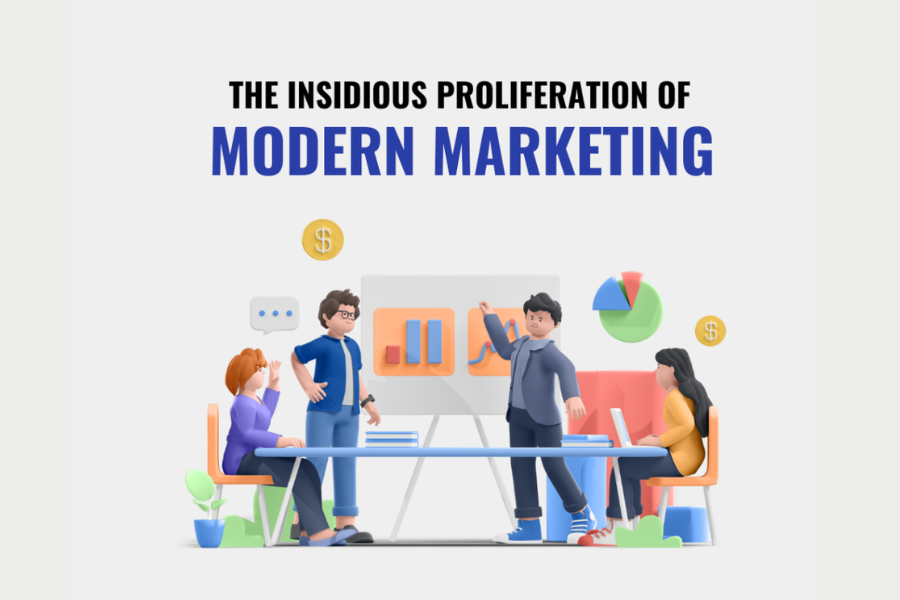The Insidious Proliferation of Marketing: An In-Depth Analysis
Marketing has long been a crucial element in driving business success by promoting products and services to target audiences. In recent years, however, the scale and intensity of marketing efforts have surged significantly. This trend, known as the “insidious proliferation of marketing,” has created a landscape where advertising infiltrates nearly every aspect of our lives. From discreet product placements in movies to highly targeted ads on social media, marketing has become an omnipresent force. This article explores the complexities of this pervasive trend and its broader implications for society.
Marketing’s Ubiquity in Everyday Life
Gone are the days when marketing was limited to TV commercials and billboards. Today, it permeates our daily lives, from the moment we wake up and check our phones to the content we consume throughout the day. Social media platforms, in particular, have become powerful marketing tools, enabling companies to deliver personalized ads based on browsing history, preferences, and even conversations. This constant exposure has normalized marketing in our lives, making it increasingly challenging to avoid its influence.
Effects on Consumer Behavior
The widespread nature of marketing has significantly impacted consumer behavior. The rise of influencer culture and advanced data analytics allows marketers to craft messages that resonate on a deeply personal level. Consequently, purchasing decisions are increasingly driven by emotional appeal and perceived social value rather than rational considerations. The subtlety of these marketing tactics often blurs the line between organic content and advertising, making it difficult for consumers to recognize when they are being influenced.
Ethical Concerns and the Manipulation of Choice
The ethical implications of pervasive marketing are a growing concern. As marketers become more skilled at using psychological insights to influence consumer behavior, questions arise about the morality of these practices. Are consumers genuinely making free choices, or are they being subtly manipulated by ads designed to exploit their vulnerabilities? This issue is particularly critical for vulnerable groups, such as children and individuals with lower digital literacy.
Technology’s Role in Marketing Expansion
Technology has been instrumental in the expansion of marketing efforts. Big data, artificial intelligence, and machine learning have empowered marketers to collect vast amounts of consumer information, enabling highly targeted and personalized campaigns. While this can result in more relevant advertising, it also raises significant privacy concerns. Many consumers are unaware of the extent to which their data is collected and used, leading to feelings of unease and distrust.
The Future of Marketing and Consumer Resistance
As marketing continues to evolve, consumer resistance is growing. People are increasingly using ad blockers, subscribing to ad-free content, and seeking out authentic, non-commercial experiences. Despite this pushback, marketers are adapting by finding new ways to integrate their messages seamlessly into engaging content. The future of marketing will likely involve an ongoing struggle between consumer autonomy and marketers’ relentless drive to capture attention and drive sales.
FAQs
What is the “insidious proliferation of marketing”?
It refers to the rapid and often subtle expansion of marketing practices into all areas of daily life, where consumers are constantly exposed to advertising messages.
How does the proliferation of marketing affect consumer behavior?
It influences consumers by targeting their emotions and social values, often leading to purchases driven more by marketing influence than by rational decision-making.
Why are there ethical concerns about modern marketing practices?
Ethical concerns arise from the manipulative nature of some marketing tactics that exploit consumer vulnerabilities, potentially compromising their ability to make free choices.
What role does technology play in modern marketing?
Technology allows for the collection of extensive consumer data, facilitating highly personalized and targeted marketing campaigns, but it also raises privacy and ethical concerns.
How are consumers resisting the proliferation of marketing?
Consumers are increasingly using ad blockers, subscribing to ad-free content, and seeking out authentic, non-commercial experiences as ways to resist pervasive marketing.
What can be done to mitigate the negative impacts of marketing?
Raising awareness about marketing tactics, advocating for stronger privacy protections, and promoting digital literacy are essential steps to mitigating marketing’s negative impacts.
Conclusion
The insidious proliferation of marketing poses significant challenges and ethical dilemmas in modern society. As marketing continues to evolve and become more pervasive, it is crucial for consumers to be aware of these tactics and for regulators to ensure that advertising practices remain transparent and fair. Understanding these dynamics is the first step toward making informed decisions in an increasingly marketing-saturated world.







